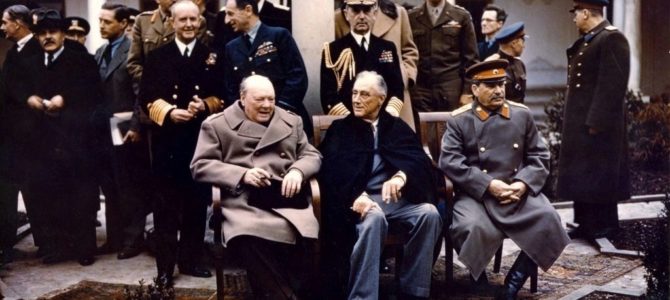
“The cost of war in human lives is constantly spread before me, written neatly in many ledgers whose columns are gravestones,” said American five-star General George C. Marshall. “I am deeply moved to find some means or method of avoiding another calamity of war.”
June 5 marks the 70th anniversary of Marshall’s 1947 Harvard University post-commencement address, where he announced the Marshall Plan’s $13 billion offer ($130 billion in 2016 dollars) to help rebuild World War II-torn Europe.
“[D]eath and atrocity seemed to be everywhere,” said “Savage Continent” author Keith Lowe. Europe witnessed 35-40 million people killed, including six million Jews exterminated in the Holocaust. Forty million people were displaced. Thirteen million children were orphaned. Violence, crime, rape, prostitution, and hunger became “a normal part of everyday life.”
Such unfathomable, historic devastation is far removed from the consciousness of our country and its classrooms. The reality is, far too few American kids learn about the world wars, the Marshall Plan, the Cold War, or stellar military leadership. Students’ performance was mediocre on the eighth grade civics portion of the 2014 National Assessment of Educational Progress, known as the Nation’s Report Card. This result has remained largely unchanged for almost 20 years.
So Let’s Fill in a Few Gaps
Among the country’s greatest generals, George Marshall was a towering statesman, playing a central role in our nation’s emergence as the world’s economic and military superpower. During World War I, he went to France with the American Expeditionary Force (AEF). Always known as a straight talker, even to his superiors, young Marshall publicly corrected AEF commander General John J. Pershing.
By mid-1918, Marshall was serving on Pershing’s staff and planning the Meuse-Argonne Offensive, which ended the Great War. After WWI, Marshall became Pershing’s aide-de-camp. Later he was elevated to brigadier general.
In 1939, President Franklin D. Roosevelt promoted Marshall to general; U.S. army chief of staff; and in 1944, general of the Army. Along with Secretary of War Henry Stimson, Marshall oversaw America’s $296 billion war preparation, which eased the Great Depression; mobilized 16 million servicemen; and produced 325,000 aircraft, 800,000 vehicles, 88,410 tanks, 1,247 ships, and 40 billion rounds of ammunition. No wonder FDR told Marshall, “I feel I could not sleep at night with you out of the country.”
After WWII, Winston Churchill proclaimed Marshall “the true organizer of victory” and prime mover behind the American military’s historic ascent—a faster climb than any fighting force had made in human history. “The United States stand at this moment at the summit of the world,” Churchill said.
Marshall served President Harry S. Truman as secretary of State and secretary of Defense, leading the U.S. reconstruction of Europe and containing Soviet dictator Joseph Stalin, whom Marshall called “a rough SOB who made his way by murder.” By war’s end, America was the sole atomic superpower. John Steele Gordon, author of “An Empire of Wealth,” reports that while Europe was war- and debt-ravaged, the United States produced half the world’s output in manufacturing, coal, oil, electricity, and gross national product.
A Mighty Warrior for Peace
For his work reshaping the post-WWII world, in 1953 Marshall became the only career U.S. military officer ever to win the Nobel Peace Prize. “In America we have a creed which comes to us from the deep roots of the past,” reads his acceptance speech. “It springs from the convictions of the men and women of many lands who founded the nation and made it great.”
Six years later, General Marshall died in Washington DC at age 78 and was interred in Arlington National Cemetery. His inspiring military career recalls this verse from British man-of-letters, Thomas Babington Macaulay: “And how can man die better / Than facing fearful odds / For the ashes of his fathers / And the temples of his gods.”
This spring, American students have been hearing frivolous commencement speeches from movie stars and pop-culture celebrities; shouldn’t graduates know about figures who matter in history? In commemorating Marshall’s statesmanship and extraordinary plan to restore post-war Europe, we should honor his farsighted leadership and public service. We should remember his central role in America’s globally transformational victories in two world wars and the Cold War.
Future generations of American citizens will be unable to do this unless states establish strong academic U.S. history standards and tests to meet graduation requirements, which would ensure that all schoolchildren are taught the lessons necessary to perpetuate our democratic ideals.









